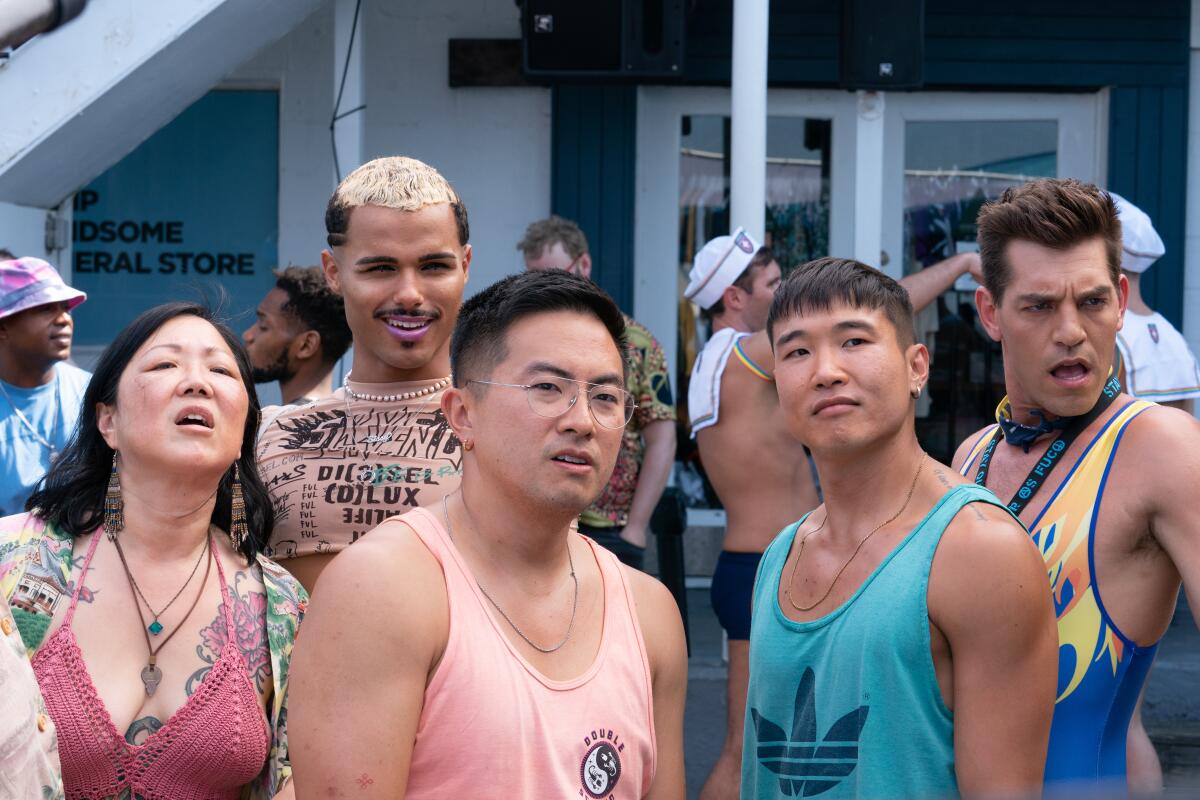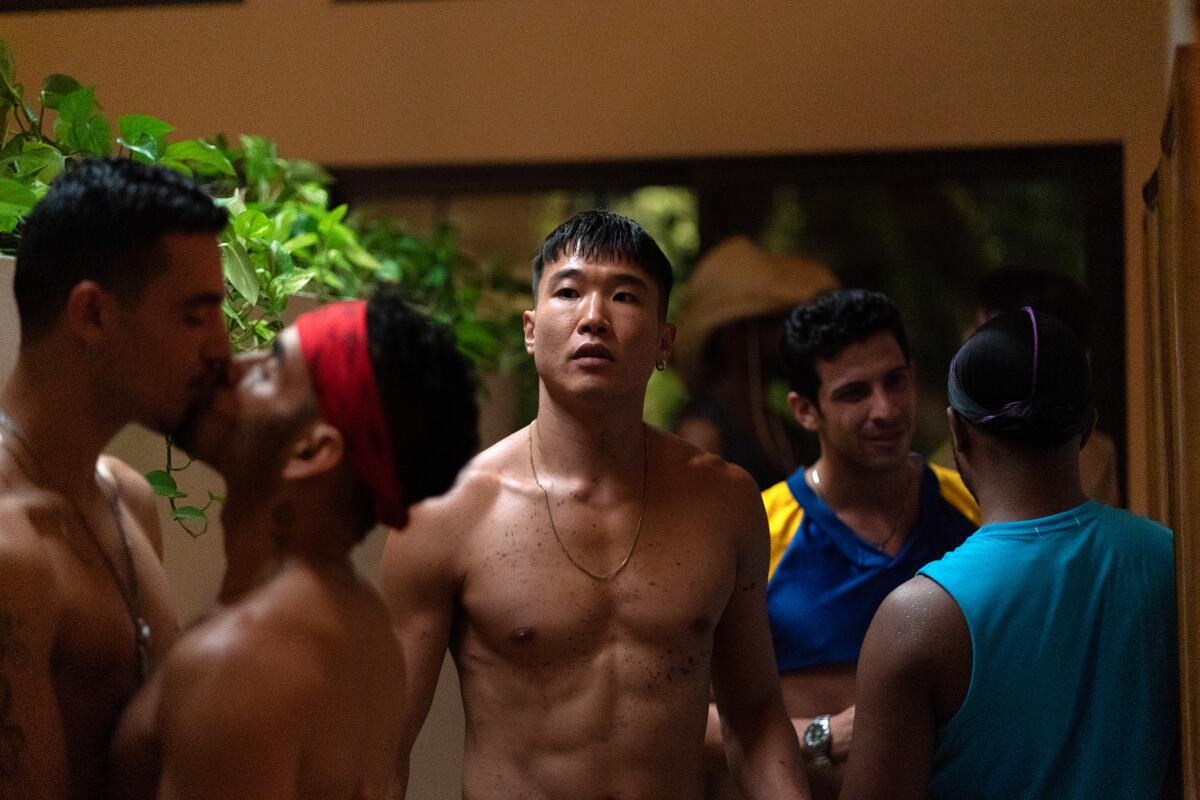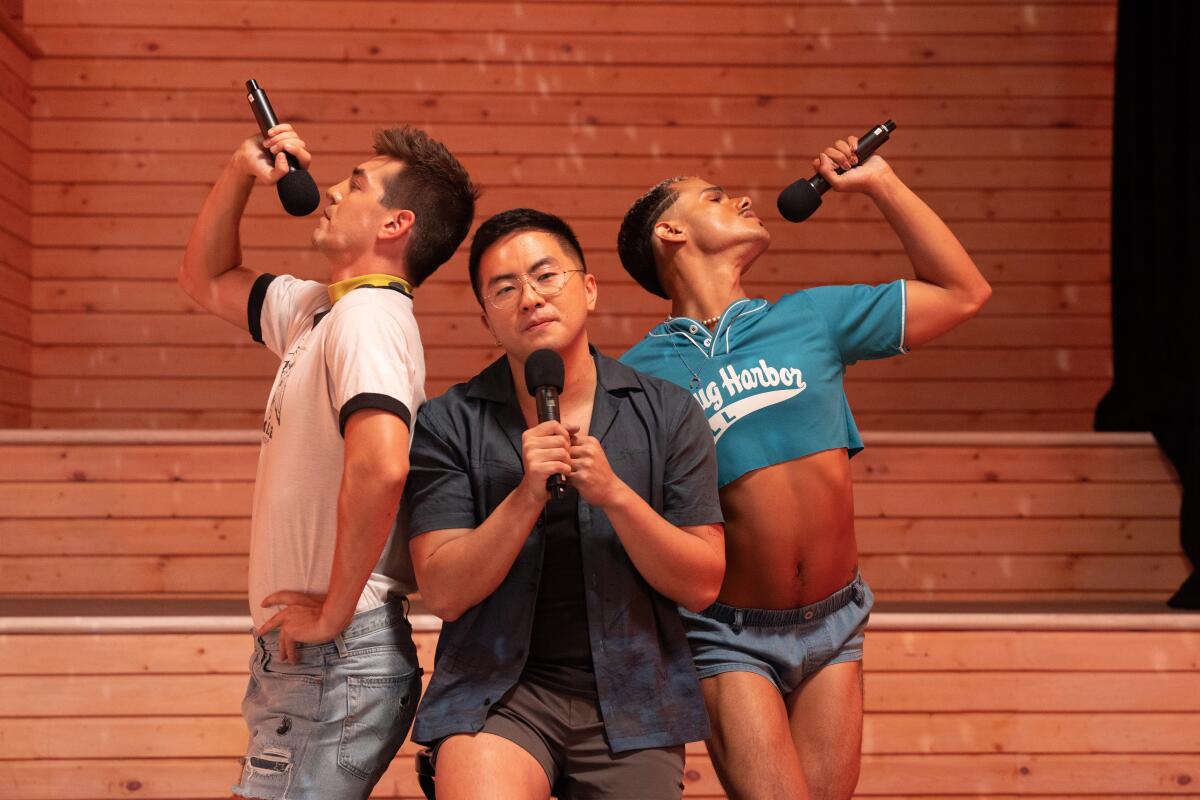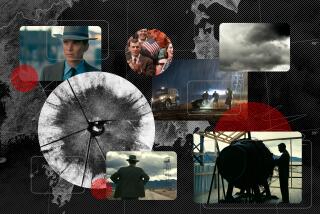In Hulu rom-com ‘Fire Island,’ love wins. But it’s not an easy victory

- Share via
Loving and sweet, Andrew Ahn’s “Fire Island” whisks you off on a sunny, celebratory week at a gay resort where a group of friends are having their last big party before they firmly enter adulthood. Their extravagant trip promises sex and drugs, and plenty of catty spats in between.
When Noah (Joel Kim Booster, also the film’s screenwriter) arrives on the retreat, he makes a promise with his sensitive best friend Howie (Bowen Yang) — a successful, perpetually single, graphic designer. Noah won’t succumb to his own sexual desires until he gets Howie a boyfriend. It’s a touching thought, at least until they meet quiet yuppie Charlie (James Scully) and all of his toxic friends. One in particular, the taciturn Will (Conrad Ricamora), confuses and frustrates Noah. And yet — in shades of the film’s inspiration, Jane Austen’s “Pride and Prejudice” — their tender, open-hearted diversions feed every corner of this romping rom-com.
“Fire Island” takes a long breath before it fully ignites, with the first half of the film crawling under the pressure of Booster’s clunky voice-over. The overwrought exposition, which feels like a structural holdover from the movie’s developmental origins as a Quibi series, gums up the pacing. In explaining how his friend group worked at the same brunch spot, Noah introduces Luke (Matt Rogers) and Keegan (Tomás Matos) as flamboyant theater school dropouts; Max (Torian Miller), a gay Black man who reads Madeleine Albright biographies; and Erin (Margaret Cho), the group’s tattooed lesbian den mother. These scant details do nothing to connect viewers to the supporting players. Instead, they exist as signifiers of varying gay archetypes deployed as hollowed-out stand-ins for Austen characters.
For its first half, Ahn’s film bends over backward to placate to heterosexual viewers and is all the weaker for it. Providing reductive lessons in gay culture, the grating voice-over describes Fire Island as a gay Disney World with a community separating levels of attraction based on race, ethnicity, wealth and body types. Such heavy-handed observations dull what’s billed as an endless summer movie.

The script is padded with try-hard humor (an overly self-referential Quibi joke; a reference to “Saturday Night Live” skit “Gays in Space”) and even the introduction of Charlie, the Mr. Bingley to Howie’s Jane, and Will, the Mr. Darcy to Noah’s Elizabeth, initially grinds in the sand. You would hardly be blamed for stopping “Fire Island” at the halfway point as it slowly meanders from trite to soporific.
But once Booster’s script smooths into the narrative beats of “Pride and Prejudice,” “Fire Island” discovers a pulse. The connections between the movie’s supporting characters and Austen’s novel adds richer textures to their travails, such as the introduction of seemingly nice and soft-spoken hunk Dex (Zane Phillips), whose arc parses the hollow aesthetics of the island. And as the comedy starts to click — an entire scene of Miller and Matos delivering dueling Marisa Tomei in “My Cousin Vinny” impersonations is priceless — so does the romance.
Booster and Ricamora discover a seductive groove with their spin on the classic courtship of Mr. Darcy and Elizabeth. Their animosity organically shifts into affection, and although Booster can play some beats too on the surface, his bitchiness in the scenes with Ricamora could launch a thousand ships. A committed Ricamora brings an unlikely genuineness to their burgeoning romance with his physical presence and vocal inflections. And Ahn begins to locate the deeper soul beyond a sensual cat and mouse game.
Times critic Justin Chang noted that Ahn’s previous film, “Driveways,” “lingers … in that rueful gray zone between humor and sorrow.” There’s a similar mood that modulates throughout “Fire Island” in the friendship between Noah and Howie, two Asian gay men with different levels of self-confidence. Proudly nonmonogamous, well-read and quite frankly, ripped, Noah’s solitude is a choice. Howie, on the other hand, doesn’t consider himself conventionally attractive. And as Noah pushes Howie toward Charlie — often patching up his friend’s waning confidence through laughs — a sorrow lurks in the center, waiting for one of them to broach its devastating boundaries.

The truth is Howie’s loneliness leaves a void that Noah cannot fill — and Yang acutely collapses the shell separating comedy and anguish. His sincere performance hits on body positivity, friendship and dejection far more precisely than any glib voice-over could, and does so with the evident ease that’s made him an Emmy-nominated “SNL” breakout.
Even as it finds its footing, “Fire Island” can be too much. There are about three false endings, and the needle drops perform more than their share of the emotional heavy lifting (even if Britney Spears’ “Sometimes” never disappoints). But the heart behind the familiar rom-com choices: the parting of two flames, the last-second pursuit to save a relationship and the happy ending that follows — cannot be doubted. It’s laughter and it’s loving that Ahn’s “Fire Island” gleefully contains.
'Fire Island'
Rating: R, for strong sexual content, language throughout, drug use and some nudity
Running time: 1 hour, 45 minutes
Playing: Starts June 3 on Hulu
More to Read
Only good movies
Get the Indie Focus newsletter, Mark Olsen's weekly guide to the world of cinema.
You may occasionally receive promotional content from the Los Angeles Times.










